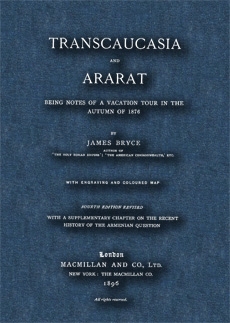| Éditeur : Macmillan Co | Date & Lieu : 1896-01-01, New York |
| Préface : | Pages : 528 |
| Traduction : | ISBN : |
| Langue : Anglais | Format : 135x200 mm |
| Code FIKP : Lp. Ang. Pri. 286 | Thème : Mémoire |
|
Présentation
|
Table des Matières | Introduction | Identité | ||
 Transcaucasias and Ararat The Volga and the steppe of southern Russia North-western Russia, although it is now pretty easy of access from Western Europe, and contains two such wonderfully striking cities as Moscow and St. Petersburg, is very little visited by travellers. South-eastern Russia is hardly visited at all. Nijni Novgorod, whose great fair draws some few sight¬seers as well as men of business from Germany and the farther west, seems to be the limit of the tourist, and beyond it, all the way to Tiflis or Constantinople, one does not see a single stranger travelling for pleasure, and discovers from the attentions which the western visitor receives, how rare such a visitor is. I need, therefore, make no apology for giving some short account of the Lower Volga, and the great steppe of Southern Russia, before getting to the Caucasus and Armenia, for all four is likely to be equally unfamiliar to English readers. As this does not apply to the gathering which has made Nijni famous, there is no occasion to describe it here, especially as a full account of the fair and its … | |||||
|
PREFACE TO THE FIRST EDITION The following pages contain a record of impressions received during a journey in the autumn of 1876 through Russia, the Caucasian countries, and the Turkish Empire. They are first impressions only, for which no value can be claimed except that which belongs to impressions formed on the spot, and (as the author trusts) without a prejudice in favour of either of the states which are now contending in the regions here described. Yet even first impressions, if honestly formed, may sometimes atone for their crudity by their freshness. What most readers desire to know about a country is how it strikes a new-comer. A book that tries to give this, to present the general effect, so to speak, of the landscape, may have its function, and may at the same time interest, though it cannot satisfy, the scientific student of geography or politics. The author, however, did not travel with the intention of writing a book, and might not, sensible as he is of his imperfect knowledge, have now thought of sending these notes to the press but for two reasons. One is the unexpected importance which the outbreak of war in the countries he visited has given to them. The other is the curiosity which he has found (since his return) to exist in England regarding Mount Ararat, a mountain of which every one has heard, but about which comparatively little has been written. He is indebted to his friends Captain J. Buchan Telfer, R.N., Mr. Douglas W. Freshfield, and Professor Judd, of the Royal School of Mines, for information on several points. The publication of the book has been delayed by a domestic sorrow which has destroyed such pleasure as the composition of it might have given the loss of one whose companion he had been in mountain expeditions from childhood, and to whom he owes whatever taste he possesses for geographical observation and for the beauties of nature. Lincoln's inn, London September 12th, 1877. By the same author The American commonwealth, by the rt. Hon. James Bryce, M.P. for Aberdeen. In two Vols. Extra Cr. 8vo. The National Government - The State Governments - The Party System. Public Opinion - Illustrations and Reflections - Social Institutions. Vol. I. 125. 6d. Vol. II. Third Edition, completely revised throughout, with Additional Chapters, 12s. 6d. Athenoeum. - " The high expectations which were formed by all those who learned that Mr. Bryce was preparing a book on the United States of America are justified by the book itself. Mr. Bryce has established a right to be accepted as an authority in all matters with which he deals. Few display his industry in investigating, and his capacity for co-ordinate facts. He has the root of the matter in him. He takes nothing for granted, and he takes little at second hand, his conclusions being deduced from incontestable premises." The holy Roman Empire. Arnold Prize Essay, 1863. Fourth edition. Crown 8vo. 7s. 6d. Library Edition. 8vo. 14s. Tablet - "Mr. Bryce has made the republic of letters his debtor by the publication of his Essay on the Roman Empire. The style is clear and flowing, the arrangement good, while the extensive learning displayed by the author will doubtless stand him in good stead in any future works." Scotsman - "We are glad to see a new edition of this thoughtful and masterly book… The idea is wrought out by Mr. Bryce with great completeness and power, and with ample knowledge of the subject. It is a book to be studied." Impressions in South Africa. 8vo. [In the Press. Macmillan and co., ltd., London. | ||||